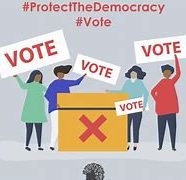
Our polarized society is now facing a crucial challenge to one of the most existential pillars of our democracy – free and fair elections, including the peaceful transfer of power. Like so many other controversial issues of today, passions run high, misinformation is extensive and the “blame game” is in full swing.
Democracy is basically a brand, a type of government that makes a promise (e.g. legitimate elections) to the public (its customers). To be successful, democracy requires enough trust in the integrity and credibility of the voting process, especially the equal right to vote for all qualified Americans. However, proposals in many states have been introduced that could arguably limit these fundamental rights. Critics claim the motivation is focused on politics and power, while others rationalize a change is necessary to avoid fraud.
Trust is the Problem
These high anxiety accusations present a critical challenge to the sustainability of our democracy and any solution will be handicapped by the unimaginable lack of trust in our partisan government and society today. For example the most recent Edelman Trust Barometer (1/18/22) shows the trust level at its lowest level ever:
- Government – trust has dropped to only 43%, a decline of 10 points since 2017, due mainly to the Government’s failure to lead in the Covid pandemic. Related to this, government officials or politicians are the least trusted (42%), followed by journalists (46%), while scientists have a much higher trust level (75%).
- Sectors – the most trusted are technology (74%), education (69%) and healthcare (69%), with social media the lowest at 44%.
- By Political Party – Democrats tend to be more trustful than Republicans: overall 55% versus 35%, in Government 53% versus 29% and in media 50% versus 24%.
Truth and Social Media
Perhaps the greatest threat to our democracy comes from the unbounded misinformation spread primarily in social media. This recent Edelman study shows that concern by the public over fake news has risen to a high of 76%. In particular, trust in social media dropped 8 points in the past decade to only 37%, compared to traditional media of 57%. Facebook and more recently Spodify with its popular Joe Rogan are the most prominent social platforms cited for spreading misinformation, especially on the the Covid pandemic and anti vaccinations
Another perspective on the dangers from social media is from Tristan Harris, co-founder of The Center for Humane Technology. Their research has confirmed that the main way for social media to extend its reach (and hence its profits) is to feed on passionate subscribers who are “addictive, polarized, outraged and/or already misinformed”. The algorithms in social platforms allow these people to more quickly spread such disinformation. Harris convincingly argues that this relentless flow of unchecked falsehoods and the rise in partisanship can seriously undermine democracy.
Another dimension of the decline of trust and integrity is the credibility of political posturing. The recent description by the RNC of the violent insurrection on 1/6/21 as a “legitimate political discourse” stretches the credibility of extreme conservatives.
Is There A Solution?
One possible avenue is through business and the rise of stakeholder capitalism. This new Edelman report shows business as the most trusted institution, with 60% of consumers buying brands based on their shared values and beliefs. “Business must now be the stabilizing force delivering tangible action and results on society’s most critical issues,” said Richard Edelman, CEO of Edelman. “Societal leadership is now a core function of business.”
The public wants business to be more proactive too. A recent survey of 10,000 consumers of the nation’s largest publicly traded companies/brands by Oberland revealed that 83% of their consumers believe corporations have a duty to protect their (and their employees’) right to vote.
It all boils down to trust and truth. “This vicious cycle of distrust threatens societal stability and democracy” says Edelman. “It’s a death grip where media is chasing clicks and government is chasing votes, both feeding a cycle of disinformation and division and exploiting it for commercial and political gain.”


